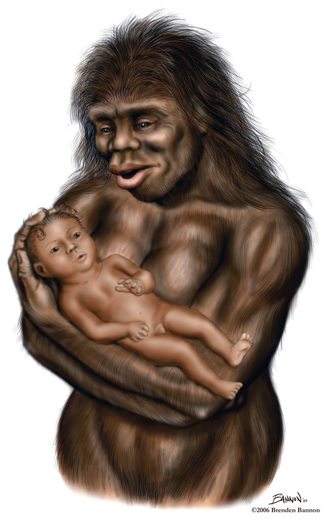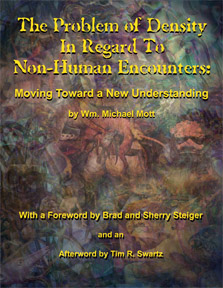It comes in the soul-rending blackness of night - eager for the sweet
taste of fresh, innocent psyches who live unknowing in the bright forgiving daylight. Unaware of clotting truths that infect the
less-tangable voids that nestle alongside our own world. Surrounded by
empty form, eyes that glow blood-red linger in a state of forever within
the darkness reserved for our most secret, anguished nightmares. Yes
that's right! Conspiracy Journal is here once again to fill your minds
with all the news and info that THEY don't want you to hear.

- Contact Aliens By Beaming The Internet Into Space -
- Creature Known as "Zana" May Have Been Human Subspecies -
AND: Japan’s Defense Minister Says ET Has Never Invaded Japan
All these exciting stories and MORE in this week's
issue of
CONSPIRACY JOURNAL!
~ And Now, On With The Show! ~
PS: You're invited to join Tim Swartz and
Mike Mott every Sunday at Midnight for fabulousguests.
Just go to theouteredgeradio.com
on almost any internet device. Tim
Beckleyco-hosts the Sunday of every
month. Paranormal radio like you've never heard
it before.
Incredible New Book From Conspiracy
Journal

UFO Repeaters
Seeing is Believing!
OVER 100 NEVER BEFORE PUBLISHED UFO PHOTOS! ARE THEY THE CHOSEN?
Here are well documented cases of those rare individuals who have
experienced an ongoing series of encounters with UFO occupants – and
have the uncanny ability to take remarkable photos of their craft on an
ongoing basis. – Some showing the aliens themselves!
THEY ARE KNOWN AS THE “UFO REPEATERS”. . .
From the very first UFO sighting, it was assumed that a UFO witness was
simply in the “right place at the right time” and that observing another
UFO sometime in their life would be like being stuck by lightening more
than once.
But this concept is now generally thought to be utterly false – for
there is a subset of “very special” individuals who have the uncanny
ability to “call down” UFOs at will and to even take repeated
photographs of their craft.
UFO expert Tim Beckley asks probing questions like: – Is the UFO
Repeater solely responsible for the images on film or video? Do the
aliens keep track of their “Chosen Ones” with perhaps an implanted
homing device? Or does the repeat witness blindly stumble on to a locale
that has become a “hotspot” that draws repeated UFO activity?
This book features some of the individuals who have the
described “magical and mental powers” to sustain an ongoing relationship
with other-worldly beings.
“UFO Repeaters: Seeing Is Believing! The Camera
Doesn't Lie” offers a wonderful opportunity to see and ponder dozens of
new photos taken by a tiny segment of humanity who the UFO occupants
have selected to reveal themselves to on a one to one basis over a long
period of time.
You can also phone in
your credit card orders to Global Communications
24-hour hotline: 732-602-3407
And as always you can
send a check or money order to:
Global Communications
P.O. Box 753
New Brunswick, NJ 08903 Please make out checks to: Timothy Green Beckley
- BACK IN THE NEWS AGAIN DEPARTMENT -
Joni Mitchell's Condition - Morgellons, Yes, It's Real
By Meredith Melnick

Iconic
folk singer-songwriter, Joni Mitchell was hospitalized Tuesday after
being found unconscious at her Los Angeles home. She has yet to
disclose the cause, but Mitchell, 71, has discussed a number of health
complaints in recent years, including Morgellons disease -- a
mysterious illness that has been the subject of ongoing debate among
medical researchers and patients. People who believe they have
Morgellons say it's characterized by an array of skin symptoms,
including sores, a crawling sensation either on or under the skin, and
what the Mayo Clinic describes as "fiber-like filaments emerging from
the sores." Morgellons is not a medically accepted diagnosis and
researchers have not definitively determined where the fibers come
from. Some have found evidence that the filaments are merely cotton
from clothing or bandages that stick to the wounds, but others suggest
the fibers are somehow produced by the body, according to Newsweek. "Fibers
in a variety of colors protrude out of my skin like mushrooms after a
rainstorm: they cannot be forensically identified as animal, vegetable
or mineral," Mitchell told The Los Angeles Times in 2010. In her
memoir, "Joni Mitchell: In Her Own Words", the songwriter, who famously
survived polio as a child, described how Morgellons symptoms have
affected her: "I couldn't wear clothing. I couldn't leave my house for
several years. Sometimes it got so I'd have to crawl across the floor.
My legs would cramp up, just like a polio spasm. It hit all of the
places where I had polio." In 2012, the U.S. Centers for Disease
Control and Prevention published a comprehensive investigation into 115
San Francisco Bay Area patients who comprised a cluster of Morgellons
cases. CDC investigators found some similarities, but no underlying
cause. Most of those who were studied fit the profile of a white
woman in middle age, who reports overall fair to poor health. A
majority reported chronic fatigue and displayed some cognitive
impairments, such as memory loss or attention deficit. A significant
percentage had symptoms of depression and signs of "preoccupation" with
health. Half tested positive for at least one illicit or prescription
drug -- including amphetamines, barbiturates, benzodiazepines,
cannabinoids, cocaine, opiates and propoxyphene. (Many drugs include
the sensation of skin-crawling as a side effect.) "No parasites
or mycobacteria were detected," the CDC researchers reported. "Most
materials collected from participants' skin were composed of cellulose,
likely of cotton origin." They concluded the disorder was
psychosomatic. And, as The New York Times pointed out, it potentially
is a manifestation of a well-known psychiatric condition: delusional
infestation, in which patients erroneously believe their skin is
infested with bugs. Many who identify as Morgellons patients
reject this label, including Mitchell. "In America, the Morgellons is
always diagnosed as 'delusion of parasites,' and they send you to a
psychiatrist," Mitchell said. "I'm actually trying to get out of the
music business to battle for Morgellons sufferers to receive the
credibility that's owed to them." But, as Torie Bosche pointed
out at Slate at the time of the CDC report, the researchers didn't say
Morgellons doesn't exist. "Psychosomatic does not mean they are “faking
it”; it just means there is no medical cause," Bosche said. She
continued: "The reluctance to accept the CDC
study's results highlights the different ways society views medical
conditions and psychological conditions. If we treated them equally, a
psychosomatic diagnosis would not bother patients so much; but because
of the stigma of mental illness, people are loath to accept such a
diagnosis." Of course, that's little comfort to people who
believe they're suffering from the disease. Indeed, coverage of
Mitchell's illness has focused on whether Morgellons is real, perhaps
undermining her own efforts to gain credibility for people with who
think they have the condition. Source: The Huffington Post http://www.huffingtonpost.com/2015/04/02/morgellons-disease-joni-mitchell _n_6993524.html
- MORGELLONS, NEW RESEARCH DEPARTMENT -
Morgellons Disease - Still Here
By Tim Swartz
 The
recent resurgance in interest by the media for Morgellons has shown an
obvious lack of any real research on the subject by reporters and
editors. Sufferers of Morgellons reach far beyond the knee-jerk
profiling of middle age white woman as put forth by the U.S. Centers of
Disease Control. In 2006, former Oakland A's pitcher Billy Koch revealed that he had Morgellons and so did his wife and their three children. Koch
said it started in 2002 where in Oakland he saved 44 games and was the
top reliever in the major leagues. His fastball wowed crowds. And then
the strangeness began. "He freaked out. He wanted to
ignore it I wanted to too. But when it comes to your kids, you gotta
stop ignoring it," said Koch's wife Brandi. She describes
their symptoms: "It was the scariest thing I had ever realized in my
entire life. There was matter and black specks coming out and off of my
skin." Within two years -- at age 29 -- Billy Koch was out
of baseball, partly because of the uncontrollable muscle twitching that
went on for months at a time and often kept up him up all night. The disease is characterized by slow healing skin lesions that often extrude small, dark filaments, especially after bathing. "That's when it would really just ooze -- literally ooze out of my skin," explained Brandi Koch. The
couple was at wit's end after numerous doctors not only provided little
in the way of relief, but actually were skeptical about their health
problems: "There's no reasonable explanation for it. I'm not seeing
things. l'm watching it happen. We're pretty sane people" lamented
Billy. Infectious disease specialist Dr. Neelam Uppal
sympathized with the Kochs' plight: "They've seen several doctors,
[and] everybody's told them they're crazy. It's in their head. They're
delusional." Dr. Uppal gave the Kochs and fifteen other
patients a powerful anti-parasite medicine and antibiotics that helped
temporarily. But the filaments come back. Testing of the
filaments brought no results, according to Dr. Uppal: "I've seen [it];
sent it to the lab. They can't identify it. They'll say 'They're
nothing.'" The reaction of medical professionals has made
a difficult situation even harder for Brandi Koch: "It's not enough
that you're suffering and hurting. It's 'You're an idiot!' and 'You're
crazy!' on top of it. I'm really hurt and sad and scared." The
Kochs may be the most recognizable of more than 3,000 families
nationwide reporting these same unexplained symptoms. There are curious
clusters, in Florida, along the Gulf Coast and in the San Francisco Bay
Area. That's where we begin our investigation into new clues to this
medical mystery. San Francisco physician Rafael Stricker
took samples last spring from Bay Area sufferers. Patients report
pustules and filaments that most doctors dismiss. Dermatologists
claimed the filaments were all delusions, although none had studied
them. Oklahoma State University Professor Randy Wymore was
the first scientist to conduct research on this disconcerting disease.
He says it's the biggest mystery he's ever been involved in. "Pathologists
and dermatologists and lab reports [said] that these were textile
fibers appearing in the skin of the sufferers. Now that's just not
true, to be perfectly blunt about it," says Prof. Wymore. Wymore
says his tests rule out not only textile fibers, but also worms,
insects, animal material and even human skin and hair. He says the
filaments are not an external contamination. Instead, they are a substance that materializes somehow inside the body, apparent artifacts of something infectious. In
2014, The Charles E. Holman Morgellons Disease Foundation released the
results of several years of exhaustive research into Morgellons.
In this study it was revealed that Morgellons disease has infectious
agent etiology and that that infectious organisms were present in
Morgellons patient skin lesions. Evidence of the human pathogens
Borrelia burgdorferi and Helicobacter pylori were identified by the
analysis of whole genome sequencing. In other words, Morgellons is a true somatic illness associated with Borrelia spirochetes that cause Lyme disease. Recent
studies reported similarities between Morgellons and bovine digital
dermatitis (BDD), a disease that is common in dairy herds. BDD is
characterized by skin lesions that commonly occur on and directly above
the heel bulb of the hind feet of cattle. Chronic BDD lesions
demonstrate proliferative keratin filaments, and histological
examination of diseased tissue reveals spirochetes identified as
Treponema spp. As with BDD, Morgellons filaments are not textile
fibers. Instead, the fibers are biofilaments of human cellular origin
produced by epithelial cells and stemming from deeper layers of the
epidermis and the root sheath of hair follicles. Immunohistochemical
and histological staining has demonstrated that these multicolored
filaments are composed of collagen and keratin. Exactly why the
filaments are produced is still not understood. They could be a method
for the spirochetes to protect themselves from the bodies immune
system, and/or a method for further proliferation. There is
still a lot that is not understood about Morgellons. That is why
the scientific community and the media have to be mindful of snap
judgements and allow further research to take place. The sufferers from
this mysterious disease also deserve to recieve the proper treatment
that is needed. As well, they also deserve the sensitivity from
health practitioners to not be ignored or immediately dismissed as
being mentally unsound.
- SPAMMING ET WITH CAT VIDEOS AND PORN DEPARTMENT -
Contact Aliens By Beaming The Internet Into Space
By Jessica Orwig

One
scientist at the Search for Extraterrestrial Intelligence (SETI)
Institute, doesn't want to send just one message: He wants to broadcast
billions of messages by transmitting the entire internet into space.
"Such
a large corpus — with its text, pictures, videos and sounds — would
allow clever extraterrestrials to decipher much about our society, and
even formulate questions that could be answered with the material in
hand," Seth Shostak wrote on March 27 in the opinion section of The New
York Times.
Shostak is a senior astronomer and director of the
Center for SETI Research. His article "Should We Keep a Low Profile in
Space?" explores the controversial issue of whether we should
deliberately try to make contact with aliens.
So far, the only
effort humankind has made to contact aliens is to listen and search for
messages traveling through space that look as if they were sent by an
intelligent species.
If ET is out there, it seems as if they are
not announcing their existence, at least not to us. The search has
turned up nothing throughout the many decades of searching with SETI's
series of telescopes. Shostak and his colleagues at SETI think it's
time to step up and make our presence in the universe known to any
species out there listening.
"It may be that signaling of our
intention to make contact is what's really required to trigger a
response," director of SETI's interstellar message composition, Douglas
A. Vakoch, told Business Insider.
Judging from what he wrote, we
think that it's Shostak's plan to transmit the entire internet into
space, and while that would certainly send a message, would it be the
right one?
Any alien civilization capable of decrypting a memo
like that would have everything they need in order to make contact,
annihilate our species, or both.
Equally bad would be if they
took one glance at the number of puppy videos, porn sites, and other
perpetual nonsense circulating the wires and decided we're not ready
for contact.
"Simple back-and-forth exchanges would take
decades. This suggests that we should abandon the 'greeting card'
format of previous signaling schemes, and offer the aliens Big Data,"
he writes.
Regardless of whether we should or should not transmit the Internet, we have the technology to do it.
"Sending
the web on its way would take months if a radio transmitter we used,"
Shostak writes in his article. "A powerful laser, conveying bits much
like an optical fiber, could launch these data in a few days."
Source: Yahoo News
http://finance.yahoo.com/news/scientist-wants-contact-aliens-plan-224808408.html
- A GRAND UNION OF BEASTIES DEPARTMENT -
Exploring American Monsters: Colorado
By Jason Offutt

Known
for its Wild West history, and great skiing, Colorado also boasts a
wealth of dinosaur fossils, is the birthplace of Frank Welker (the
voice of Fred from Scooby Doo), and a variety of geography, such as
high plains, most of the Southern Rocky Mountains, and desert. The
perfect habitats for Bigfoot?
Well, sure. Colorado has a long
history of Bigfoot encounters, but “Exploring American Monsters” isn’t
about well-known cryptids like Bigfoot, it’s about bizarre hidden
monsters like the Slide Rock Bolter.
Slide Rock Bolter illustration by Coert Du Bois in the 1910 book “Fearsome Creatures of the Lumberwoods.”
Slide Rock Bolter
Miners
and lumberjacks in the 1800s came out of the mountains with tales of a
land whale that lived on the slopes, and fed off any animal that
wandered in front of it – especially people. This huge creature would
lurk at the tops of mountains, lying in wait for days, unmoving. It
latched itself onto the mountainside with hooks on the end of its
massive fluked tail. When prey approached, it would release the hooks,
and slide down the slope, tearing through trees, and boulders, before
swallowing its dinner with its huge, saw-toothed mouth.
One of
the earliest accounts of the Slide Rock Bolter in print was in the 1910
book, “Fearsome Creatures of the Lumberwoods,” by William T. Cox. As
the years went on, and Colorado became a vacation spot, the Slide Rock
Bolter has been blamed for missing tourists it apparently loves to dine
on.
The grave of Fodor Glava – the Lafayette Vampire.
Vampires
In
2010, a woman drove her SUV into a canal in Mesa County, Colorado, and
told authorities the wreck was caused by a vampire, according to The
Denver Post. She drove on a dirt road near the town of Fruita on the
Western Slope when she saw a vampire on the road. Terrified, the woman,
not identified by police, put the SUV into reverse, and drove it off
the road where it overturned. Authorities said she was not under the
influence of drugs or alcohol.
This isn’t the first report of a
vampire in Colorado. In the late 1800s and early 1900s, the mining town
of Lafayette, east of Boulder, attracted workers from the eastern
United States, as well as Europe. One of these workers was Fodor Glava
from Transylvania – the Lafayette Vampire.
When Glava died in
1918, rumors started circulating that he was a vampire. When a tree
sprouted from his grave on what would be the chest region of Glava (now
six feet under), people were convinced the tree grew from a stake
driven into his heart, Claudia Lund, curator of the Lafayette Miner’s
Museum, told Colorado’s News9. A blood-red bush that grows next to the
grave didn’t help matters.
Living Dinosaurs
Myrtle Snow,
of Pagosa Springs in north-central Colorado, in 1982 told Empire
Magazine that, as a child she’d seen living dinosaurs. In 1935, when
she was three, she saw “five baby dinosaurs.” After the dinosaurs
attacked a local farmer’s sheep, the farmer shot one, and she got a
good look at it. “My grandfather took us to see it the next morning,”
she told Empire. “It was about seven feet tall, was gray, had a head
like a snake, short front legs with claws that resembled chicken feet,
large stout back legs and a long tail.”
A fanciful tale? Maybe, if it was the only one.
Over
the years, residents of Pueblo, in southeastern Colorado, have claimed
to see Tyrannosaurus-Rex-type dinosaurs running through the
countryside. The creature, a small T-Rex at about three feet tall, has
powerful hind legs, tiny front legs, and a long tail.
Source: Mysterious Universe
http://mysteriousuniverse.org/2015/04/exploring-american-monsters-colorado/
- LONG LOST RELATIVES DEPARTMENT -
Creature Known as "Zana" May Have Been Human Subspecies
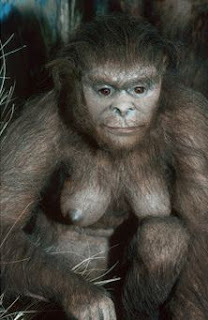
Hundreds of explorers, theorists and fantasists have spent their lives searching for the infamous 'big-foot'.
But a leading geneticist believes he has found evidence to prove that it - or rather she - could have been more than a myth.
Professor
Bryan Sykes of the University of Oxford claims a towering woman named
Zana who lived in 19th Century Russia - and appeared to be 'half human,
half ape' - could have been the fabled yeti.
Witnesses described
the six-foot, six-inches tall woman discovered in the Caucasus
mountains between Georgia and Russia as having 'all the characteristics
of a wild animal' - and covered in thick auburn hair.
Famously
known as the ape woman, Zana had at least four children by local men
and some of her descendants still live in the region, the Times
reported.
Sykes made an astonishing discovery when he carried
out saliva tests on six of her living relatives and the tooth of her
deceased son Khwit.
The DNA analysis revealed that they all
contained the right amount of African DNA for Zana the ape woman to be
'100 per cent African' but remarkably she did not resemble any known
group.
Her resemblance was that of a wild beast - 'the
most frightening feature of which was her expression which was pure
animal,' one Russian zoologist wrote in 1996.
The man who
organised various eyewitness accounts of Zana wrote: 'Her athletic
power was enormous. She would outrun a horse and swim across the Moskva
river even when it rose in violent high tide.'
Some have
argued that she was a runaway Ottoman slave but Professor Sykes says
her 'unparalleled DNA' refutes that theory. He believes her
ancestors came out of Africa over 100,000 years ago and lived in the
remote Caucasus for many generations.
Zana was eventually
'tamed' by the nobleman who bought her as a servant and kept her on his
estate in Tkhina in the Republic of Abkhazia. Accounts from the time
claim she was incredibly muscular, slept outdoors and ran around naked
until she died on the estate in 1890.
Some of his colleagues
doubt his other findings - which include a claim that an unknown
species of bear might account for yeti sightings in Bhutan. Despite the
lack of hard proof from the analysis of the alleged 'yeti hairs', he
says he has developed a strong sense that 'something is out there'
after speaking to dozens of witnesses.
Professor Sykes could
not say if the yeti, bigfoot or the Russian almasty is the best
candidate for a surviving race of human 'apemen'.
He said:
'Bigfoot has many more people trying to find it. But I suppose either
the yeti or the alma / almasty, which live in inaccessible and very
thinly populated regions, is the most likely.'
Source: The Daily Mail
http://www.dailymail.co.uk/news/article-3025466/Was-19th-Century-Siberian-apewoman-
yeti-6ft-6in-Russian-serf-outrun-horse-not-human-according-DNA-tests.html
The Story of Zana
By Igor Bourtsev
From: "In the Footsteps of the Russian Snowman" by Dmitri Bayanov In
Abkhazia, Western Caucasus, it is believed by the local population that
there are "wildmen" who live in the forests and mountains who are
called "abnauayu." While collecting reports in 1962,
zoologist Prof Alexander Mashkovtsev, heard and studied the story of
Zana. Subsequently, Boris Porshnev took over where his late companion
left off. The following information is borrowed from Porshnev's work
"The Struggle for Troglodytes." Zana was a female abnauayu who
had been caught and tamed and who lived and died within the memory of a
number of people still alive at the time of the research. She was
buried near the village of Tkhina in the Ochamchiri District of
Abkhazia in the 1880s or 1890s. The manner of her capture is
vague. Some said it was not a chance catch. Hunters familiar with an
age-old technique tied her up, and, when she furiously fought back, hit
her with cudgels, gagged her mouth with felt, and shackled her legs to
a log. Probably she had already changed hands by sale when she
became property of the ruling prince D.M. Achba who was the
titular head of the Zaadan region. She passed into the possession
of one of his vassals, named Chelokua and still later she was presented
to a nobleman, Edgi Genaba, who visited the region. He took her
away, still shackled and chained, to his estate in the village of
Tkhina on the Mokva River, 78 kilometres from Sukhumi. At
first Genaba lodged her in a very strong enclosure and nobody ventured
in to give her food, for she acted like a wild beast. It was thrown to
her. She dug herself a hole in the ground and slept in it and for the
first three years she lived in this wild state, gradually becoming
tamer. After three years she was moved to a wattle-fence enclosure
under an awning near the house, tethered at first, but later she was
let loose to wander about. However she never went far from the place
where she received her food. She could not endure warm rooms and the
year round, in any weather, slept outdoors in a hole that she made
herself under the awning. Villagers teased her with sticks
thrust through the wattle-fence, and she.would snatch them with fury,
bare her teeth and howl. Her skin was black, or dark grey, and
her whole body covered with reddish-black hair. The hair on her head
was tousled and thick, hanging mane-like down her back. She
could not speak, over decades that she lived with people, Zana did not
learn a single Abkhaz word; she only made inarticulate sounds and
mutterings, and cries when irritated. But she reacted to her name,
carried out commands given by her master and was scared when he shouted
at her. And this despite the fact that she was very tall, massive and
broad, with huge breasts and buttocks, muscular arms and legs, and
fingers that were longer and thicker than human fingers. She could
splay her toes widely and move apart the big toe. From
remembered descriptions given to Mashkovtsev and Porshnev, her face was
terrifying; broad, with high cheekbones, flat nose, turned out
nostrils, muzzle-like jaws, wide mouth with large teeth, low forehead,
and eyes of a reddish tinge. But the most frightening feature was her
expression which was purely animal, not human. Sometimes, she would
give a spontaneous laugh, baring those big white teeth of hers. The
latter were so strong that she easily cracked the hardest walnuts. She
lived for many years without showing any change: no grey hair, no
falling teeth, keeping strong and fit as ever. Her athletic power was
enormous. She would outrun a horse, and swim across the wild Mokva
River even when it rose in violent high tide. Seemingly without effort
she lifted with one hand an eighty-kilo sack of flour and carried it
uphill from the water-mill to the village. She climbed trees to get
fruit, and to gorge herself with grapes she would pull down a whole
vine growing around the tree. She ate whatever was offered to her,
including hominy and meat, with bare hands and enormous gluttony. She
loved wine, and was allowed her fill, after which she would sleep for
hours in a swoonlike state. She liked to lie in a cool pool side
by side with buffalos. At night she used to roam the surrounding hills.
She wielded big sticks against dogs and on other perilous occasions.
She had a curious obsession for playing with stones, knocking one
against another and splitting them. She took swims the year
round, and preferred to walk naked even in winter, tearing dresses that
she was given into shreds. However, she showed more tolerance toward a
loin-cloth. Sometimes she went into the house, but the women were
afraid of her and came near only when she was in a gentle mood; when
angry she, presented a scary sight and could even bite. But she obeyed
her master, Edgi Genaba, and he knew how to bring her to heel. Adults
used her as a bogy figure with children, although Zana never actually
attacked children. She was trained to perform simple domestic
tasks, such as grinding grain for flour, bringing home firewood and
water, or sacks to and from the water-mill, or pull her master's high
boots off. But she became the mother of human children, and this
is the wonderous side of her life story, very important for the science
of genetics. Zana was pregnant several times by various men, and,
giving birth without assistance, she always washed the newborn child in
the cold water-spring. The half-breed infants, unable to survive these
ablutions, died. So, when subsequently Zana gave birth, the
villagers began taking the newborn babies away from her in good time,
and reared them themselves. Four times this happened, and the children,
two sons and two daughters, grew up as humans, fully-fledged and normal
men and women who could talk and possessed reason. It is true that they
had some strange physical and mental features, but nonetheless they
were fully capable of engaging in work and social Life The
eldest son's name was Dzhanda, and the eldest daughier was Kodzhanar.
The second daughter was named Gamasa, and the younger son Khwit, who
died in 1954. All had descendants of their own, scattered across
Abkhazia. There were rumours that the father of Gamasa and Khwit
was in fact Edgi Genaba himself, but in the census they were put down
under a different surname, and their family-name became Sabekia. It is
significant that Zana was buried in the family cemetery of the Genabas,
and that the two youngest children of Zana were brought up by Genaba's
wife. Gamasa and Khwit were both powerfully built, had dark
skins, but they inherited scarcely anything from Zana's facial
appearance. The complex of human features, inherited from their father,
was dominant in them and overruled the mother's line of descent. Khwit,
who died at the age of 65 or 70, was described by his fellow-villagers
as little different from the human norm, except for certain small
divergences. He was extremely strong, difficult to deal with and quick
to pick a fight. In fact, he lost his right hand after one of the many
fights he had with his fellow-villagers, but his left hand sufficed him
to mow and do other work on a collective farm, and even climb trees.
When old, he moved to the town of Tkvarcheli where he eventually died,
but he was taken back for burial at Tkhina. The next stage of
the Zana case was taken up by attempts fo find her grave and skeleton.
Here is what Boris Porshnev Says about his first effort in that
direction: In September 1964, the archaeologist V.S.Orelkin and
I made our first attempt to find Zana's grave. The cemetery was wildly
overgrown and only the ten-year-old mound over Khwit's grave could be
picked out among the bracken covering the hillside. Nobody else had
been buried since then. Zana must be somewhere near. We asked
the old residents and the last scion of the Genaba dan,
seventy-nine-year-old Kenton. He was clear that we should dig under a
pomegranate tree. What was found there turned out to be the remains of
one of Zana's grandchildren who had died early, for the profile that we
established from the skull was extraordinarily like the profiles of
Zana's two living grandchildren whom I myself had met. After two
more expeditions the search party had still not found Zana's bones,
though in a third attempt in October 1965, they found what are probably
the bones of Gamasa, as they present slight, but definite
paleoanthropic features. After the passing of Porshnev it fell
to my lot to continue the search. I headed three expeditions to
Abkhazia in search of Zana's skeleton, in 1971, 1975 and 1978, which
merits a separate story. Our difficulty was that by that time the last
scion of the Genaba dan had passed away and nobody knew exactly
where Zana's grave was. We put in a tremendous amount of spade work on
that hillside, digging sticky clayey earth under almost daily
downpours. During the second expedition I was taken seriously ill with
an illness which doctors failed to identify. We never found a skeleton
that would fit Zana's features as described by witnesses. It was
then decided to exhume the skull of Khwit, Zana's younger son, whose
grave was still well indicated. Professor N. Bourchak-Abramovich
assisted me in that digging. I brought the skull to Moscow where
it was studied by two physical anthropologists, M.A.Kolodieva and
M.M.Gerasimova. The results of the study were reported by me at the
Relict Hominoid Research Seminar and the Moscow Naturalists' Society
and published in 1987. Anthropologist M.A.Kolodieva compared the
skull of Khwit with the male skulls from Abkhazia in the collection of
the Moscow State University Institute of Anthropology and found that
Khwit's skull was significantly different. Indicating it as the Tkhina
skull, she writes: "The Tkhina skull exhibits an
original combination of modern and ancient features... The facial
section of the skull is significantly larger in
comparison with the mean Abkhaz type ... All the measurements and
indices of the superciliary cranial contour are greater not only than
those of the mean Abkhaz series, but also than those of maximum
size of some fossil skulls studied (or rather were comparable with the
latter). The Tkhina skull approaches closest the Neolithic Vovnigi II
skulls of the fossil series..." On her part, anthropologist M.M.Gerasimova came to following conclusions:
"The skull discloses a great deal of peculiarity, a
certain disharmony disequilibrium in its features, very large
dimensions of the facial skeleton, increased development of the
contour of the skull, specificity of the non-metric features (the
two foramina mentale in the lower jaw, the intrusive bones in the
sagittal suture, and the Inca bone). The skull merits further extended
study." So the bottom line of the Zana case today is this: we
have nothing but the words of witnesses to describe Zana's peculiar
nature, but the hard and specific evidence of her son's skull goes a
long way in making the testimony of witnesses more solid and
trustworthy.
- THE DEEP, WHAT MYSTERIES THE HOLD DEPARTMENT -
Aliens and UFOs at World's Deepest Lake
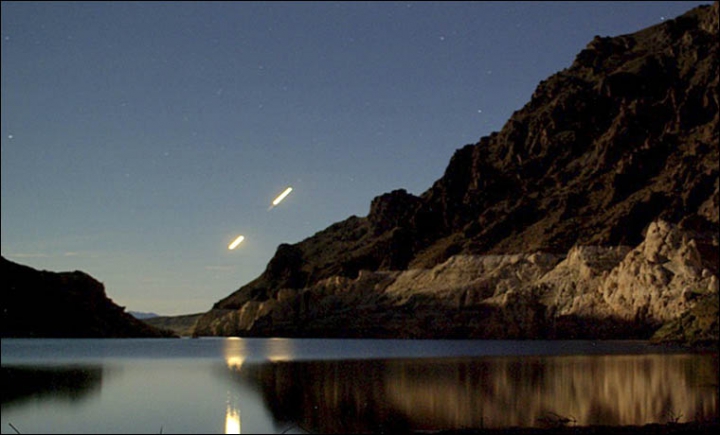 Since
ancient times, the vast Lake Baikal has been known as deeply
mysterious, but in the closing years of the Soviet era, and since, it
has been the location of a number of alleged sightings of aliens and
UFOs. Initially these were covered-up by the authorities of the USSR, but later they were revealed by the Russian media. In
recent days there have been unconfirmed reports in Russia that American
director Steven Spielberg is planning a documentary based on these
weird and unexplained accounts. At the time of writing, this appeared
to be a hoax, though it was unclear who planted stories in the Russian
media. True or not about Spielberg's interest, the lake is perhaps the biggest focus of UFOs in Russia. The
versions of extra-terrestrial activity at Baikal - edged by mountains
and containing one-fifth of the world's unfrozen freshwater - relate to
supposed aliens seen by military divers in its depth, and large
'spaceships' hovering over its grey, moody expanses. Some of
the images here show what two photographers claimed were UFOs buzzing
the lake, while others are mock-ups from NTV based on descriptions of
an incident at Kudara-Somon, in Buryatia, exactly a quarter of a
century ago. A case for which there were no images, but an
intriguing description, occurred at Kurma, Irkutsk region, in 17 April
1987. The words that follow are from Valery Rudentsov, a local resident
of nearby Shida village: 'There was 13 of us. At about
12.20am, one of our guys went out into the yard, a few seconds later
runs, and calls all of us out. He stood in the centre of the yard and
pointed his finger at the sky. 'Diagonally from his gesture -
150 metres above us - hung a huge flying saucer. From the centre
of the plate went a phosphorescent purple ray. And at the edges of the
plate were yellow portholes, almost like in our rural houses. The
diameter of the plate was 70 metres. We saw it so clearly and for a
long time, someone even suggested he throw a stone at it ... 'The
weather was amazingly quiet, no sound was heard from the hanging
saucer, although behind us was the village of Kurma - there was the
noise of a dog barking, the lowing of cows. We were spellbound. 'It
was a full moon and the visibility was so clear that no one of us could
doubt the reality of what we saw. And then the plate slid smoothly
away, sailed along the shore of the bay and further slipped into the
hills of Olkhon. Neither before nor after have I ever met such a thing. 'But
since that time it has been a kind of sacrilege to me - not to believe
in UFOs. My friend Alexander, a hunter, and his colleagues who lived
there for 20 years, often see UFOs - and all is fine, he is still
alive. So if to speak about glowing balls or 'cigars', we constantly
see these on the shores of Lake Baikal. They exist.' The case
highlighted by NTV channel was on 16 May 1990 in the village of
Kudara-Somon, in Kyakhtinsky district, some 300 km from Ulan-Ude,
capital of the Republic of Buryatia. Olga Fedorova, a local
resident, recalled: 'At some moment everything turned yellow. My
daughter came home from school. I looked - her face was yellow.' The explanation soon became clear, according to accounts from villagers. Vasily
Timofeev spoke of a flying saucer. 'Its diameter was around 30 meters,
it shone brightly. But I did not see a clear image of metal or
something like this.' Another resident Margarita Tsybikova said:
'From this dish came down people in shiny, shimmering costumes.' Olga
explained: 'There were people, as far as I remember, three people in
shining yellow suits. Seems there were people, yes.' Marina
Zimireva, who also says she witnessed this extraordinary sight, said:
'It was some kind of circle, it can be said, it was like a disk. It
turned on the edge and and, well, windows were visible. 'I
personally decided for myself that they were people. They had some
human image. They were the same - straight, slender, they had arms and
legs. And their gait was the same as ours. A little lower down there
were three in orange suits. They went down from the disk like a
man - the steps were very visible.' Then, as they
recounted the strange event, the 'aliens' saw the people watching them.
They returned to their spaceship and flew away. Game warden
Gennady Lipinsky also recalls seeing a UFO. 'When I saw it, it was
flying low. Until it disappeared over the horizon, I kept looking at
it. I call it a fireball, and what it really was - I cannot know.' The
chairman of the Union of Photographers of Buryatia, Sergey Konechnykh,
Ulan-Ude, was quoted about a much more recent incident, on 9 July 2009,
at around 10pm. 'My son and I went out to the balcony, to see
the last of the waning sunset. Suddenly there appeared these two
glowing points and they hovered over the water.' His pictures of
this incident are clear yet perhaps raise as many questions as they
answer. They show two glows in the night sky, featuring a yellow core
with an orange-red surround. By his account, the mysterious crafts rose and rebased elsewhere on Baikal's surface. Around
the same time, Anna Vinogradova, recalled a different but equally
strange sight on the water. 'We were standing with tents on the beach
and at night we saw orange-red flashes, as if a huge fires,' she said. At
Listvyanka in July 2010, a picture taken by Nikita Tomin, shows three
green-shaded lights on a UFO flying above the lakeside resort in
Irkutsk region. 'It flew right above us, very low. The object was shining down on us with a green light. We were a bit scared,' he said. But
the accounts also include 'aliens' in the deep waters of Baikal.
Interestingly, unlike several other Siberian lakes, Baikal is not seen
as home to a Loch Ness-style monster, but rather boasts space-like
aliens under its murky surface. For example, Vyacheslav
Lavretevich, a rescuer, recalled an incident but did not give the date.
'We were on a yacht on Lake Baikal, and from under us flew out a
huge glowing disk. It blinded us, and for a second flew into the sky. 'We
did not even have time to grab any cameras, nor take video,
although many of us saw it. It was a huge - and lit up all of our
yacht. In diameter it was probably 500-700 metres, a huge disk. 'For
three minutes it shone from below (the surface), and then abruptly
departed in a second. The spectacle was huge, awesome. Beautiful, and
shocking.' Oleg Chichulin was also on a boat, training students. Near Cape Svyatoi Nos they saw strange objects. 'There
was a ball that glowed. And then this ball started to fade, fade and
blush. And it turned into a red ball. This red ball for a while lay on
the water, and then began to sink. And all this gradually, gradually
went under the water. And it became dark.' Yet there are even more intriguing accounts of underwater aliens in the vast lake. In
1977, when Leonid Brezhnev ruled the Kremlin, two researchers named
V Alexandrov and G Seliverstov, were in a submersible device at a
depth of 1200 metres in the lake. The researchers turned off
their spotlights, to explore the depth of penetration of sunlight into
the water. Suddenly the scientists were bathed in light from an unusual
'glow'. Aleksandrov recalled: 'It was so like if our device was
lit from above and the side by two strong spotlights. Only a minute
later, unknown floodlights went out, and we found ourselves in total
darkness.' In 1977 two researchers named V
Alexandrov and G Seliverstov, were in a submersible device at a depth
of 1200 metres in the lake and observd strange lights. Picture: Vokrug
Sveta In 1982, seven military divers were reported to have come
across aliens under the waters of Baikal. Alexey Tivanenko, a doctor of
history, said: 'At a depth of 50 metres, they met swimmers,
around three metres tall, dressed in tight-fitting silvery suits. They
did not have any scuba or other devices, just helmets on their heads. 'They
received an order to catch the Ihtiander (half-boy, half-shark, from
modern Russian folklore) - but they were immediately washed ashore with
signs of decompression. 'They had two decompression devices, but
one was broken. All seven people could not be put inside, so they put
only four of them. And those three people, who were not put in the
device, died on the beach.' Tivanenko has likened the
descriptions to ancient petroglyphs seen by some as being aliens
visiting Earth. 'I have hundreds of drawings with these 'Sons of the
Sky',' he told NTV. 'They are united by the fact that all of
them are tall, dressed in suits, all with the helmets on their heads.
And there are mechanisms used by astronauts today.' 'I have hundreds of drawings with these 'Sons of the Sky', told Alexey Tivanenko. Pictures: NTV Reports
surfaced several days ago in the Russian media that Spielberg was
expected at Baikal in May, and that he intends to make a documentary
entitled Depth 211. Citing the 'press service' of MUFON -
the Mutual UFO Network, a US-based organisation that investigates UFO
sightings - news source infobaikal.ru and others reported his trip. Yet
there was no confirmation from the Hollywood director, who has made
such films as Close Encounters of the Third Kind and E.T. the
Extra-Terrestrial, would be arriving, nor further detail on the
reported project. Later, Komsomolskaya Pravda and IA Teleinform denied the reports but without quoting any sources close to the director. Source: Siberian Times http://siberiantimes.com/other/others/features/f0077-aliens-and-ufos-at-worlds- deepest-lake/
- I WAS WORRIED OVER NOTHING DEPARTMENT -
Japan’s Defense Minister Says ET Has Never Invaded Japan
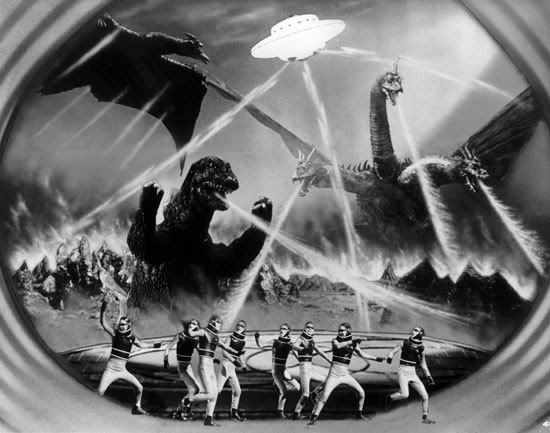 Alien
spaceships have never entered Japanese airspace, the country’s defense
chief told the Diet on Thursday, amid questioning about the threat from
space aliens. Defense Minister Gen Nakatani said the nation’s
warplanes can be scrambled whenever there is a report of an
unidentified flying object. But, he said, jets have so far encountered
no UFOs from space. “When the Air Self Defense Force detects
indications of an unidentified flying object that could violate our
country’s airspace, it scrambles fighter jets if necessary and makes
visual observation,” he said. “They sometimes find birds or
flying objects other than aircraft but I don’t know of a case of
finding an unidentified flying object believed to have come over from
anywhere other than Earth,” he said. Nakatani, a sober
politician with a reputation for thorough understanding of his brief,
was responding to a question from flamboyant wrestler-turned-lawmaker
Antonio Inoki. At a meeting Wednesday of the Upper House Budget
Committee, Inoki had asked if aircraft were dispatched to meet
extraterrestrial visitors and “whether studies are going on.” Inoki,
known for his outsized chin and trademark red scarf, said he did not
know whether or not aliens existed, but he had once seen a mysterious
flying object rocket into the air on the horizon and disappear. Wednesday’s exchange was not the first official Japanese pronouncement on space aliens and their aircraft. A
2007 statement said the government “has not confirmed the existence of
unidentified flying objects believed to have come from anywhere other
than Earth.” But the statement, formally endorsed at a Cabinet
meeting, prompted a surprise rebuttal from the top government
spokesman. “Personally, I absolutely believe they exist,” said Nobutaka
Machimura, chief cabinet secretary at the time. The defense
minister of the day, Shigeru Ishiba, also said that in his personal
opinion there were “no grounds” to deny the existence of UFOs
controlled by alien life-forms. Source: Japan Times http://www.japantimes.co.jp/news/2015/04/02/national/aliens-never-tried-invade-space-japans -defense-minister/#.VSFni5OQRiY
Sign
up today for Bizarre Bazaar and Conspiracy
Journal Magazines
|









 The
recent resurgance in interest by the media for Morgellons has shown an
obvious lack of any real research on the subject by reporters and
editors. Sufferers of Morgellons reach far beyond the knee-jerk
profiling of middle age white woman as put forth by the U.S. Centers of
Disease Control.
The
recent resurgance in interest by the media for Morgellons has shown an
obvious lack of any real research on the subject by reporters and
editors. Sufferers of Morgellons reach far beyond the knee-jerk
profiling of middle age white woman as put forth by the U.S. Centers of
Disease Control. 
